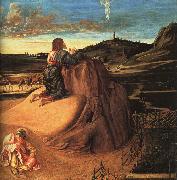
Oil On
Canvas, Real Flavor of Old Masters
|
Giovanni Bellini
|
|||
|
|
|||
| Italian High Renaissance Painter, ca.1430-1516 (b ?1431-6; d Venice, 29 Nov 1516). Painter and draughtsman, son of (1) Jacopo Bellini. Although the professional needs of his family background may have encouraged him to specialize at an early date in devotional painting, by the 1480s he had become a leading master in all types of painting practised in 15th-century Venice. Later, towards the end of his long life, he added the new genres of mythological painting and secular allegory to his repertory of subject-matter. His increasing dominance of Venetian art led to an enormous expansion of his workshop after c. 1490; and this provided the training-ground not only for his numerous shop-hands and imitators (generically known as Belliniani) but probably also for a number of major Venetian painters of the next generation. Throughout his career, Giovanni showed an extraordinary capacity for absorbing a wide range of artistic influences, both from within Venetian tradition and from outside. He also oversaw a technical revolution in the art of painting, involving the gradual abandonment of the traditional Italian use of egg tempera in favour of the technique of oil painting pioneered in the Netherlands. It was thanks to Giovanni Bellini that the Venetian school of painting was transformed during the later 15th century from one mainly of local significance to one with an international reputation. He thus set the stage for the triumphs of Venetian painting in the 16th century and for the central contribution that Venice was to make to the history of European art. | |||
|
|
|||
|
|
Agony in the Garden Giovanni Bellini6.jpg Painting ID:: 52 Visit European Gallery |
1459 National Gallery, London | |
Height Width |
INS/CM |
||
|
X |
|
||
|
|
|||
|
El Greco
|
|||
|
|
|||
| Greek-born Spanish Mannerist Painter, 1541-1614 Considered a representative of late Renaissance Spanish art, El Greco was actually born in Greece, on the island of Crete. After studying in Venice under Titian, El Greco settled in Toledo, Spain in 1577. At the time he was wildly popular, his emotionally religious paintings being just the ticket for the hometown of the Spanish Inquisition. After his death his work was largely ignored until the beginning of the 20th century; now he considered one of the inspired geniuses of Western art. His distinctive style features bold shapes and colors, with elongated and slightly distorted figures. In Toledo El Greco was in constant demand and liked living large: he maintained a private orchestra to accompany his meals. | |||
|
|
|||
|
|
Agony in the Garden new4/El Greco-479543.jpg Painting ID:: 30539 Visit European Gallery |
mk68 Oil on canvas 5'7"x3'8 1/4" Cuenca Diocesan Museum c.1600-1605 Spain | |
Height Width |
INS/CM |
||
|
X |
|
||
|
|
|||
|
El Greco
|
|||
|
|
|||
| Greek-born Spanish Mannerist Painter, 1541-1614 Considered a representative of late Renaissance Spanish art, El Greco was actually born in Greece, on the island of Crete. After studying in Venice under Titian, El Greco settled in Toledo, Spain in 1577. At the time he was wildly popular, his emotionally religious paintings being just the ticket for the hometown of the Spanish Inquisition. After his death his work was largely ignored until the beginning of the 20th century; now he considered one of the inspired geniuses of Western art. His distinctive style features bold shapes and colors, with elongated and slightly distorted figures. In Toledo El Greco was in constant demand and liked living large: he maintained a private orchestra to accompany his meals. | |||
|
|
|||
|
|
Agony in the Garden new4/El Greco-459979.jpg Painting ID:: 30951 Visit European Gallery |
mk68 c.1600-1605 | |
Height Width |
INS/CM |
||
|
X |
|
||
|
|
|||
|
MANTEGNA, Andrea
|
|||
|
|
|||
| Italian Early Renaissance Painter, ca.1431-1506 Italian painter and printmaker. He occupies a pre-eminent position among Italian artists of the 15th century. The profound enthusiasm for the civilization of ancient Rome that infuses his entire oeuvre was unprecedented in a painter. In addition to its antiquarian content, his art is characterized by brilliant compositional solutions, the bold and innovative use of perspective and foreshortening and a precise and deliberate manner of execution, an aspect that was commented upon during his lifetime. He was held in great esteem by his contemporaries for his learning and skill and, significantly, he is the only artist of the period to have left a small corpus of self-portraits: two in the Ovetari Chapel; his presumed self-portrait in the Presentation in the Temple (Berlin, Gemeldegal.); one in the Camera Picta (Mantua, Pal. Ducale) and the funerary bust in his burial chapel in S Andrea, Mantua, designed and probably executed by himself. His printmaking activity is technically advanced and of great importance, although certain aspects of the execution remain to be clarified. | |||
|
|
|||
|
|
Agony in the Garden new9/MANTEGNA, Andrea-949529.jpg Painting ID:: 33408 Visit European Gallery |
mk86 c.1460 Tempera on wood 63x80cm London,National Gallery | |
Height Width |
INS/CM |
||
|
X |
|
||
|
|
|||










